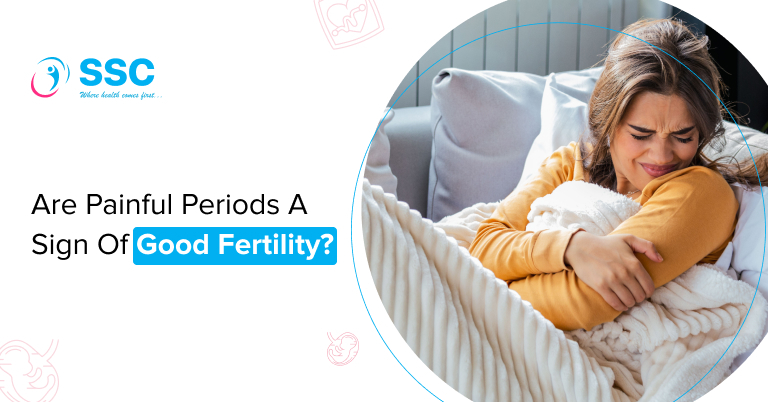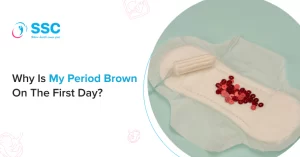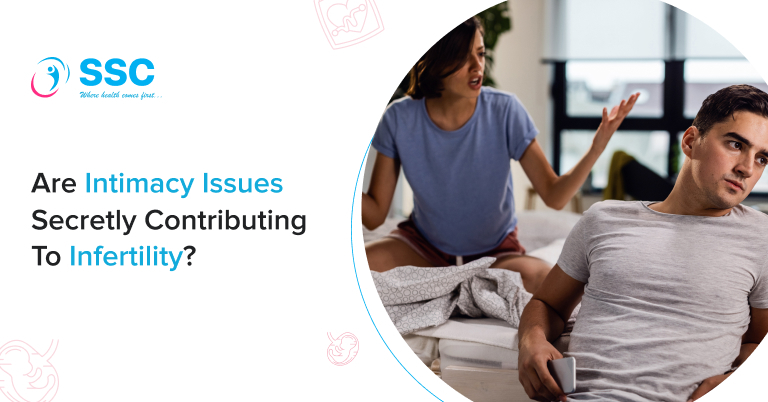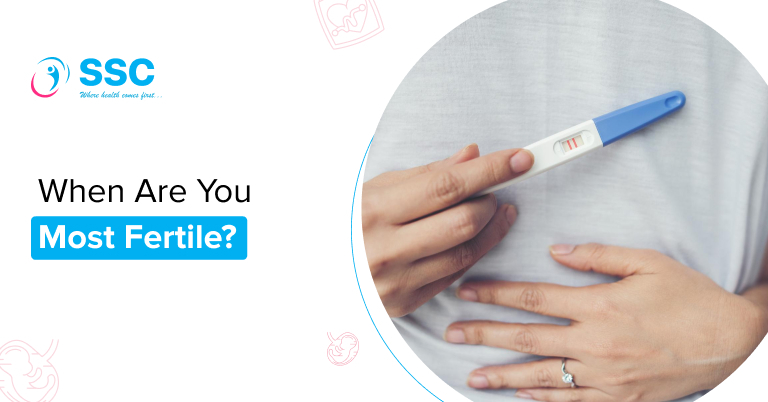Are Painful Periods A Sign Of Good Fertility?
Are painful periods normal? Should a healthy period be painful? There’s been plenty of questions circling the mention of painful periods and fertility issues. Period pain is a condition that can affect people from their early teens through menopause. You are more likely to experience period pain if your mother did.
Most women feel discomfort during periods, especially on their first day. Teenage people frequently experience period cramps. However, as you get older, if the discomfort gets worse, there may be an underlying issue. Such pains are indicative of a problem with the womb or other pelvic organs, which may ultimately compromise your ability to become pregnant.
In this article, we will briefly look into the causes of painful periods, their connection to fertility, and period pain relief tips.
Are Painful Periods a Sign of Good Fertility?
No, painful periods aren’t a sign of good fertility. There is no scientific proof that period pain level is a good indicator of fertility. Infertility is not usually indicated by painful periods, but it is also not always the case.
Painful periods don’t reveal much about fertility unless you know what is causing the pain. If you have been diagnosed with primary dysmenorrhea, it means there is no recognized illness or infection causing the pain.
Depending on the condition or infection causing the period discomfort, people with secondary dysmenorrhea may have a better awareness of their fertility. Certain medical disorders, like endometriosis, can make it more difficult to conceive, but not impossible.
What Causes of Painful Periods?
Any pain associated with the start and length of your period is referred to as menstrual cramps. Dysmenorrhea is the word for severe cramps that interfere with day-to-day functioning. Usually, cramps happen as the uterus contracts to release its lining, and some chemicals cause both difficulty and shedding.
However, cramps might have preventable causes and are not necessarily unavoidable. Severe, delayed-onset, or worsening cramps may be a sign of underlying conditions like:
Endometriosis
Endometriosis is the growth of tissue called endometrium outside the uterus that resembles the lining of the uterus. It is a painful disorder in which tissues develop on the bladder, fallopian tubes, uterus, and ovaries. Up to 10% of women between the ages of 15 and 44 have endometriosis. A menstrual cycle does not cause the endometrial tissue growing in these places to shed, leading to inflammation, scarring, and painful cysts.
It is one of the common conditions linked to women’s infertility. Only temporary infertility may result from mild to moderate endometriosis situations. A woman may be able to become pregnant with the assistance of surgery to remove endometrial tissue.
Adenomyosis
Adenomyosis involves the growth of the endometrium within and inside the uterine muscles. It is entirely different from endometriosis, where the tissue grows outside the uterus and is not the same as fibroids, like a tissue mass.
Its symptoms include painful menstrual cycles, heavy bleeding, painful sexual intercourse, and lower abdomen pressure. Although its effects on fertility are unknown, some research has shown that they could. This condition may pose problems for live birth rates, IVF, and pregnancy. Additionally, it raises the possibility of miscarriage.
Fibroids
Fibroids are benign tumors that grow in or on the uterus, cervix, and other pelvic ligaments. They differ in size and number, and they can be very tiny or huge, so there are single fibroids or multiple ones. Most women who suffer from fibroids are not aware of this condition as they show no symptoms.
It may or may not affect fertility; it depends on the location. It occasionally causes pain during periods and increases the risk of miscarriage.
Pelvic Inflammatory Disease (PID)
PID is another major cause of severe menstrual pain. PID is brought on by an infection of the reproductive organs, frequently a sexually transmitted one, that is either poorly or not treated at all. Scar tissue that develops as a result of PID resembles webbing between the uterus, fallopian tubes, and ovaries. The most typical reason for obstructed fallopian tubes is PID.
It will result in ectopic pregnancy, chronic pelvic pain, and a higher risk of miscarriage. PID can result in permanent scarring and fallopian tube obstruction if untreated. The fertilized egg may not be able to enter the uterus through the fallopian tube, which could result in infertility.
Signs of Good Fertility:
A woman’s good fertility can be determined by a number of important indicators. Consistent ovulation, cervical mucus, and regular menstrual cycles are some of these.
Age also plays a significant role in fertility, with women under 35 generally having a better chance of becoming pregnant than those over 35.
- Regular Menstrual Cycles: Fertility depends on regulated hormone production, which is indicated by regular menstrual cycles (21–35 days). Cycle irregularities could be an indication of underlying diseases such endometriosis or PCOS.
- Regular Blood Flow During Menstruation: A healthy uterine lining is necessary for implantation, and moderate blood flow indicates this. Periods that are unusually heavy or light may be a sign of possible reproductive issues.
- Tenderness of the Breasts: Following ovulation, tenderness indicates healthy hormonal activity, particularly progesterone, which promotes reproductive health and primes the body for a possible pregnancy.
- Absence of Past Pelvic Infections: The likelihood of problems during conception is decreased when there are no diseases such as PID or STDs, which guarantees healthy reproductive organs.
- Modifications to Cervical Mucus: During ovulation, stretchy, egg-white-like cervical mucus indicates high estrogen levels and a suitable sperm habitat, both of which are indicators of healthy fertility.
What is the Link Between Painful Periods and Pregnancy?
Period pains, or dysmenorrhea, typically happen in young women and girls in their teens at the beginning of menstruation. A chemical called prostaglandin causes menstrual cramps. They cause the uterine muscles to contract, aiding in the removal of the uterine lining. Inducing delivery and labor contractions are two other functions of prostaglandins.
If the levels of prostaglandins increase, it can trigger intense uterine contractions, causing oxygen to cut off temporarily to the parts of the muscle leading to painful periods.
Primary dysmenorrhea is period cramps caused by the regular activity of prostaglandins, which won’t negatively impact fertility. Secondary dysmenorrhoea is period cramps caused by any disease or abnormalities of the reproductive system that adversely affect the fertility rate.
Menstrual Pain Relief Tips
The following are some ways to combat period pain.
- Do a minimal amount of exercise. Go for a walk, stretch your body, and do some simple yoga asanas. Avoid intense workouts and gym sessions.
- Relax during your period’s time. Stay at home instead of going out. Read, sleep, and have a good, nutritious meal. Don’t skip your meals, and avoid sleeping late.
- Apply heat to your lower belly to relieve cramps. You can use heat pads or even a hot bath for this therapy.
- Try natural remedies like ginger, fenugreek, and essential oils. Avoid drinking caffeine and alcohol during periods.
Conclusion
It is best to talk with an expert about symptoms to understand your reproductive system better. Experts with decades of experience provide customized treatments for all the treatments mentioned here. Visit our fertility center and embrace the path to parenthood.
Frequently Asked Questions
Are Painful Periods Normal?
Dysmenorrhea, or painful periods, is common but not always normal. Severe or unbearable pain could be an indication of endometriosis or fibroids. Finding the cause and the best course of action might be assisted by speaking with the best gynecologists.
Are painful periods a sign of good fertility?
No, painful periods are not signs of good fertility. They may indicate more serious problems that might affect reproduction, like hormone imbalances or reproductive defects.
What are the signs of good fertility?
- Regular menstrual periods: The time and length of the cycles are consistent.
- Predictable ovulation: Regular tracking of ovulation or obvious indications of ovulation.
- Normal hormone levels: Equilibrated levels of hormones involved in reproduction.
- A balanced diet: It is high in nutrients and promotes general health.
- Adhering to a range of weight: It promotes the health of the reproductive system.
Do painful periods mean infertility?
Painful periods do not automatically mean infertility. A lot of people with painful periods can still become pregnant, even though extreme menstrual pain may be a sign of diseases like endometriosis or fibroids that might impair fertility.










